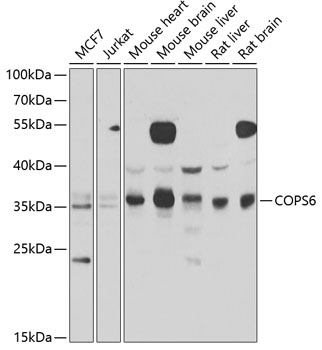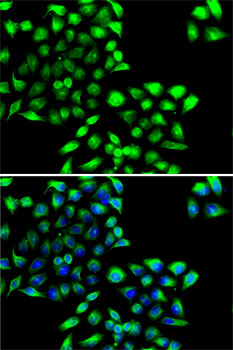-
Product Name
COPS6 Polyclonal Antibody
- Documents
-
Description
Polyclonal antibody to COPS6
-
Tested applications
WB, IF
-
Species reactivity
Human, Mouse, Rat
-
Alternative names
COPS6 antibody; CSN6 antibody; MOV34-34KD antibody; COP9 signalosome subunit 6 antibody
-
Isotype
Rabbit IgG
-
Preparation
Antigen: Recombinant fusion protein containing a sequence corresponding to amino acids 58-327 of human COPS6 (NP_006824.2).
-
Clonality
Polyclonal
-
Formulation
PBS with 0.02% sodium azide, 50% glycerol, pH7.3.
-
Storage instructions
Store at -20℃. Avoid freeze / thaw cycles.
-
Applications
WB 1:500 - 1:2000
IF 1:50 - 1:100 -
Validations

Western blot - COPS6 Polyclonal Antibody
Western blot analysis of extracts of various cell lines, using COPS6 antibody at 1:1000 dilution.Secondary antibody: HRP Goat Anti-Rabbit IgG (H+L) at 1:10000 dilution.Lysates/proteins: 25ug per lane.Blocking buffer: 3% nonfat dry milk in TBST.Detection: ECL Basic Kit .Exposure time: 10s.

Immunofluorescence - COPS6 Polyclonal Antibody
Immunofluorescence analysis of MCF7 cells using COPS6 antibody . Blue: DAPI for nuclear staining.
-
Background
Component of the COP9 signalosome complex (CSN), a complex involved in various cellular and developmental processes. The CSN complex is an essential regulator of the ubiquitin (Ubl) conjugation pathway by mediating the deneddylation of the cullin subunits of SCF-type E3 ligase complexes, leading to decrease the Ubl ligase activity of SCF-type complexes such as SCF, CSA or DDB2. The complex is also involved in phosphorylation of p53/TP53, c-jun/JUN, IkappaBalpha/NFKBIA, ITPK1 and IRF8, possibly via its association with CK2 and PKD kinases. CSN-dependent phosphorylation of TP53 and JUN promotes and protects degradation by the Ubl system, respectively. Has some glucocorticoid receptor-responsive activity. Stabilizes COP1 through reducing COP1 auto-ubiquitination and decelerating COP1 turnover rate, hence regulates the ubiquitination of COP1 targets.
Related Products / Services
Please note: All products are "FOR RESEARCH USE ONLY AND ARE NOT INTENDED FOR DIAGNOSTIC OR THERAPEUTIC USE"
